Find the Best NES Emulators to Play NES Games
The Nintendo Entertainment System (NES) transformed living rooms around the world in the mid‑1980s, bringing 8‑bit adventures like Super Mario Bros. and The Legend of Zelda into millions of homes.
Even today, its simple yet addictive gameplay. That enduring appeal has driven countless fans to seek out NES emulators—software that faithfully recreates the original console on modern devices.
In the following guide, we’ll explore the best NES emulators for 2025 across Windows, macOS, Android, and iOS, and cover the legal considerations and safety tips you need to know.
What Are NES Emulators and Why Use Them?
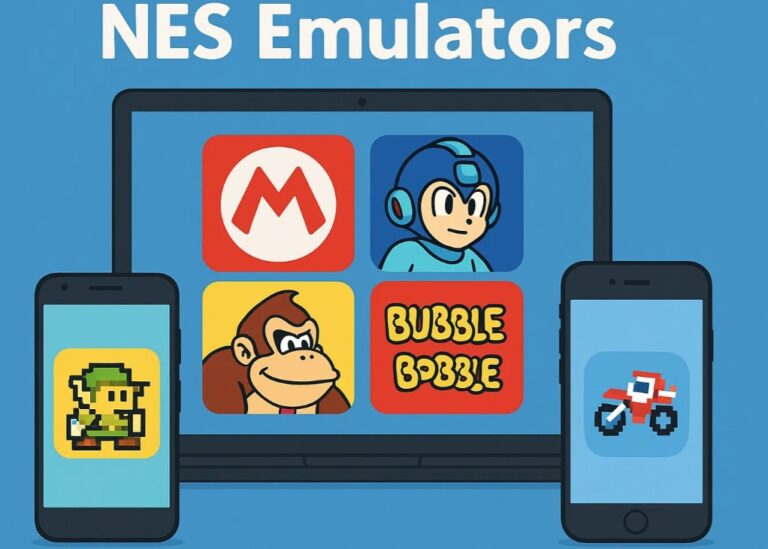
NES emulators are software programs that replicate the hardware of the original Nintendo Entertainment System. They permit you to play NES games called ROMs on modern devices such as your computer or tablet. This way, you can turn your laptop into an old-school Nintendo console.
Many players turn to emulator for NES games to reconnect with the joy of their childhood favorites, letting nostalgia wash over them with a single click. At the same time, emulation safeguards these classics from being lost to worn‑out cartridges and obsolete consoles, ensuring they remain playable for years to come.
Best of all, you get all this without hunting down rare hardware or shelling out for overpriced carts—just load your game on any modern device and start playing.
Top NES Emulators for Different Devices
This is the section that matters most: which NES emulator should you use? Here are the top options:
| Emulator | Platforms | Accuracy | Best For | Key Features | Status |
|---|---|---|---|---|---|
| Mesen X | Win, Mac, Linux, RetroArch core | ≈Perfect | Retro purists, streamers | 4K upscaling, shaders, HD packs, save sync | Active |
| FCEUX | Win, Mac, Linux | High | TAS/dev, speedrunners | Debug tools, Lua, memory watch, video capture | Active (’25 update) |
| Nestopia UE | Win, Mac, Linux | Good | Casual/netplayers | Easy setup, controller & netplay | Less active |
| RetroArch | Multi‑platform (incl. mobile/console) | Varies by core | Multi‑system library users | Universal controls, shaders, rewind, netplay | Active |
| BizHawk | Win, Linux | Focused accuracy | TAS, competitive runners | Rewind, frame advance, TAStudio, A/V capture | Active |
| Jnes | Win (32‑bit) | Good | Beginners, low‑spec systems | Lightweight, fast launch, save slots, Kaillera | Less active |
| NES.emu (mobile) | Android, iOS | Good (FCEUX‑based) | Mobile gamers | Low latency, touch/controller support | Active (’25 update) |
KeyTakeaway
Emulators generally fall into two camps—cycle‑perfect accuracy (e.g., Mesen, Nestopia) or broad compatibility and ease of use (e.g., FCEUX, RetroArch, BizHawk)—with BizHawk and FCEUX also offering built‑in TAS tools for speedrunners.
While high‑precision cores can struggle on older, low‑power hardware like early Raspberry Pi models, both Mesen and RetroArch perform flawlessly on modern PCs. To ensure you get ongoing features, bug fixes, and cross‑platform support, opt for an actively maintained emulator such as Mesen, RetroArch, or FCEUX.
1Mesen
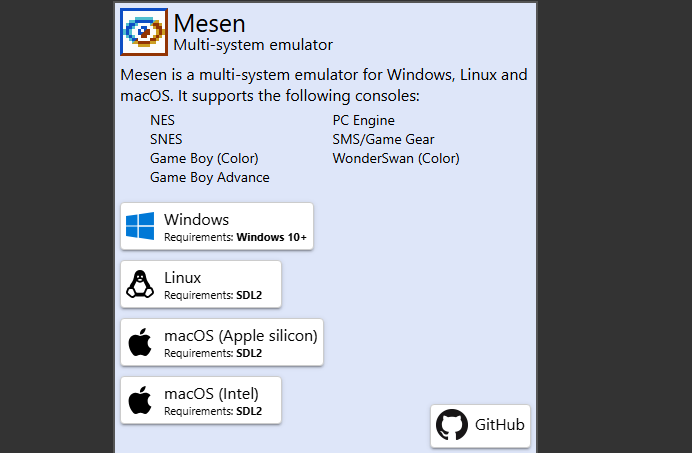
Mesen X is a community‑driven fork of the original Mesen emulator, offering cross‑platform support on Windows and Linux. It continues development to integrate the most accurate NES/Famicom emulation cores and community patches.
Mesen is consistently praised as the most accurate NES emulator available, offering "near-perfect emulation accuracy" and "an almost flawless record of compatibility and performance". It meticulously replicates the NES hardware, including the PPU's unique timings, down to even the smallest details.
Key Features:
- Cycle‑accurate CPU and PPU emulation, matching hardware behavior to within a few clock cycles
- HD texture packs, 4K supersampling and custom shaders for modern displays
- Built‑in auto‑save synchronization (Game‑resume), instant save states, and stream/record support
- Advanced debugger with memory watchers, and Lua scripting hooks
Pricing:
Completely free and open‑source (GPL‑3.0). No ads or paid “pro” features.
Feedback:
Users on Reddit and emulator forums praise Mesen X’s “near‑zero” audio/video desync and hardware‑level accuracy, making it the go‑to for “hardcore retro” enthusiasts and live‑streamers demanding authenticity
Moreover, its active development and strong community support ensures continuous updates and support.
2FCEUX

FCEUX is the long‑standing open‑source NES/Famicom (and Disk System) emulator, born from the merger of many FCE Ultra forks in 2008. It is a highly versatile and feature-rich emulator that combines the best features of earlier NES emulators.
Key Features:
- Comprehensive debugging suite: CPU/PPU tracer, hex editor, memory watch, and breakpoints
- Built‑in TAS tools (input recording/rerecording), Lua scripting support, and video/movie capture
- Cross‑platform Qt5 GUI (Win, macOS, Linux) and legacy ports (Wii, PSP, GP2X).
Pricing:
Free, open‑source (GPL‑2.0‑or‑later).
Feedback:
Often cited as the “go‑to” emulator for ROM‑hackers, TAS creators, and developers; reviewers repeatedly note its powerful debug/TAS feature set, though some find the UI dated compared to newer front‑ends.
The downside is that it might be overwhelming if you are new to NES emulators. But if you demand some advanced features, FCEUX gives you tons of tools to explore.
3Nestopia UE (Undead Edition)
If you want something easy and reliable, Nestopia UE is one of the best choices. Nestopia UE (“Undead Edition”) is a fork of the original Nestopia emulator, focusing on cycle‑accurate hardware emulation for Windows, macOS, and Linux, known for its strong accuracy and user-friendly design. It is based on the older Nestopia emulator but updated to work well on modern systems.
Key Features:
- High‑accuracy CPU/PPU timing to faithfully reproduce original game behavior
- Customizable palette, sound filters, and input‑device support (e.g. Power Glove)
- Lightweight, straightforward setup with netplay support
Pricing:
Free, open‑source (GPLv2).
Feedback:
Praised for “out‑of‑the‑box” accuracy and stability; casual players appreciate its simplicity, though it lacks the extensive debugging/TAS toolkit of FCEUX.
While it offers excellent accuracy and ease of use, it has low development activity, resulting in fewer updates and optimizations.
4RetroArch
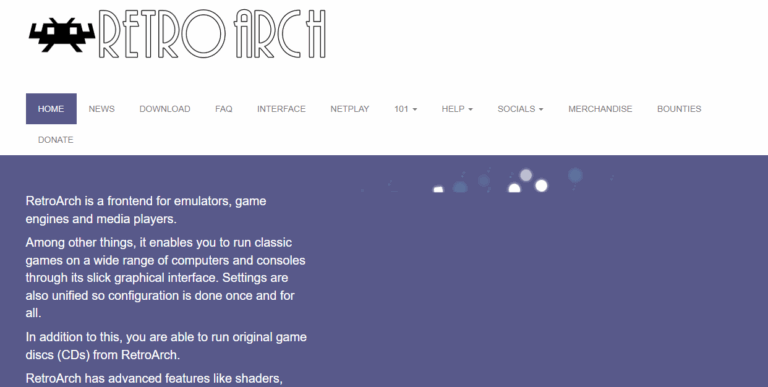
RetroArch is not itself an emulator but a libretro frontend that loads “cores” (emulation engines). By installing an NES core (e.g., Mesen), RetroArch can emulate NES alongside dozens of other systems.
Key Features:
- Unified input mapping, shader pipelines (CRT, scanlines), rewinding, run‑ahead to reduce input lag
- Peer‑to‑peer rollback netplay, automated savestate management, playlist/cover‑art browser
- Built‑in FFmpeg recording, LiveUpscale, AI‑translate overlays, and RetroAchievements integration.
Pricing:
Free, open‑source (GPL‑3.0).
Feedback:
End‑users love its one‑stop multi‑console library and advanced features but often warn newcomers about its steep configuration curve. The Run‑Ahead feature is hailed as a “game‑changer” for lag‑sensitive play.
The only downside is that it takes a bit of time to learn how to set it up properly for novices, and the performance of some simulation cores may not be as good as that of a standalone simulator.
5BizHawk
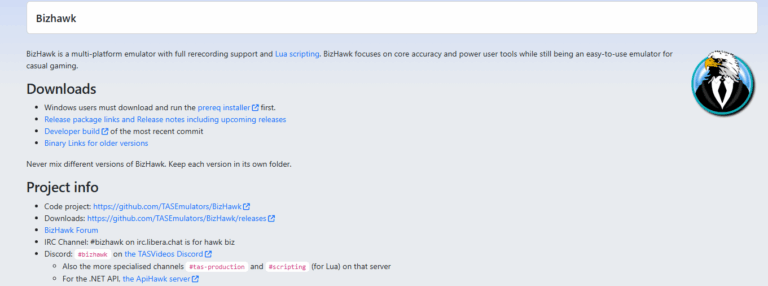
BizHawk is a .NET‑based, multi‑system emulator tailored primarily for Tool‑Assisted Speedruns (TAS), yet with a GUI simple enough for casual play. It supports NES and over 15 other systems.
Key Features:
- Integrated TAStudio for frame‑perfect input sequencing, rerecording, and input display
- Memory search/watch/poke tools, Lua scripting, and rewind functionality
- Supports NES (NESHawk), SNES, N64, GB, GBC, Genesis, Saturn and more via bespoke “Hawk” cores.
Pricing:
Free, open‑source (MIT‑style, via GitHub).
Feedback:
Speedrunners and TAS creators unanimously recommend BizHawk for its powerful debugging and recording tools; casual emulation users find it more approachable than RetroArch for multi‑system play.
6John NES

Jnes is a closed‑source NES/Famicom emulator for Windows (32/64‑bit) and Android, known for its clean, beginner‑friendly interface. It is a premium app with strong performance and incredible graphics rendering.
Key Features:
- Simple GUI with drag‑and‑drop ROM loading, instant save states
- Recording “movies” of gameplay, customizable key mappings, and basic filter effects
- Android version adds Bluetooth‑controller netplay (in‑app purchase)
Pricing:
Windows: completely free
Android: free download with optional in‑app purchases for netplay & extras
Feedback:
Windows users laud its ease of use and stability, rating it ~8.1/10 on emulator‑zone reviews; Android users appreciate the free core functionality but note the netplay/advanced features require payment
This one is not free of charges. Despite this, it is well worth the small cost if you are serious about playing NES games on Android.
7 NES.emu

This is one of the most beginner-friendly NES emulators for Android. It is a highly optimized, FCEUX‑based NES emulator for Android and iOS by Robert Broglia, targeting low‑latency mobile play.
Key Features:
- Minimal audio/video latency, VS UniSystem support, and Famicom‑disk compatibility
- Unlimited save‑state slots, configurable touch, Bluetooth/USB controllers
- Zapper/light‑gun emulation and multiplayer over Bluetooth/Wi‑Fi
Pricing:
$3.99 on Google Play and App Store; no ads, no further fees.
Feedback:
Rated ~4.3★ on Google Play with 2.8K reviews; users rave about its responsiveness and feature set, calling it “the best NES port for mobile,” though a few mention occasional minor audio glitches
It's best for Android and iOS users looking for a feature-rich, low-latency NES experience on their mobile device.
Are NES Emulators Legal?
Let’s clear up a common question: Are NES emulators legal? The short answer is yes, emulators themselves are legal software.
They’re designed to replicate how the original NES console works. As long as you download the emulator program, you are not breaking any laws.
Here comes the real issue: ROMs, which are the game files.
- If you own the original game and create a backup, that is generally okay
- Downloading ROMs of games you don’t own is considered copyright infringement
- Sharing copyrighted games is definitely illegal
So, how do people get around this? Some buy used NES cartridges and back them up with ROM dumping tools. Others play games through legal services, such as Nintendo Switch Online, which includes NES games as part of a subscription.
Tips for the Best NES Emulator Usage
Do you desire to enjoy the full magic of retro gaming? There are a few things you can do to improve your NES emulator setup. You must select the best accessories and use features built into the emulator. These simple tips will massively improve your experience and make it even more fun and nostalgic.
1. Use a Controller for Authentic Gameplay
Yes, it is possible to play with a keyboard, yet it doesn’t quite feel the same as the original experience. Using a USB or Bluetooth controller brings that classic console feel right into your hands. Many emulators work well with Xbox, PlayStation, or even retro-style USB controllers that resemble the original NES gamepads. A controller is especially helpful for fast-paced games such as Mega Man.
2. Modify Hotkeys and Save/Load States
One of the biggest advantages of emulators is the ability to save your game anytime. These are called save states. Unlike the original NES, where you had to finish a game in one sitting or rely on passwords, save states let you pause and return later. You can also load from the exact point you saved. You can set buttons for quick save, quick load, and pause!
3. Try Shaders or Screen Filters
Modern emulators let you change how games look. If you miss the curved screen and fuzzy glow of old CRT televisions, you can enable a CRT shader. Do you desire a classic look? Try pixel filters that smooth out jagged edges. These adjustments will recreate the game the way you remember it.
4. Always Scan Downloads for Viruses
Safety matters, as some emulator and ROM websites are filled with ads or suspicious files. Always use antivirus software and scan every download before opening it. Stick to well-known emulator sites and avoid anything that seems sketchy. This keeps your device secure.
Play NES Games On Big Screen With AirDroid Cast
To enjoy your NES Games on big screen like TV, we recommend you a free screen mirroring app called AirDroid Cast. Whether you play it from phone or PC, you can always cast to TVs. It's easy to use and with no cost when you cast screen in a same Wifi network.
- Step 1. Download and Install AirDroid Cast on the device you want to cast from, like phone or PC.
- Step 2. Go to your TV's or target devices' browser and enter webcast.airdroid.com.
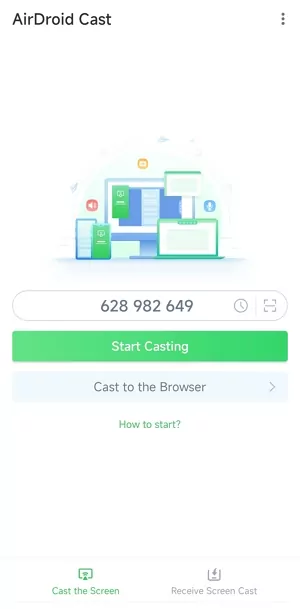
- Step 3. Enter the cast code or scan the QR code. Accept the request and you can cast.
- Step 4. Lastly, open the NES Games you wanna play on your emulator and it will be mirrored on big screen.
Bottom Line: Should You Use NES Emulators?
If you’re craving a blast from the past, NES emulators are a fantastic way to revisit your favorite retro games.
You must be smart about ROMs and stick to sources you trust. If you’re still unsure, start with something such as Nestopia UE or Nostalgia.NES to test the waters.
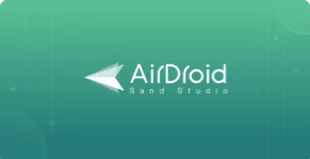










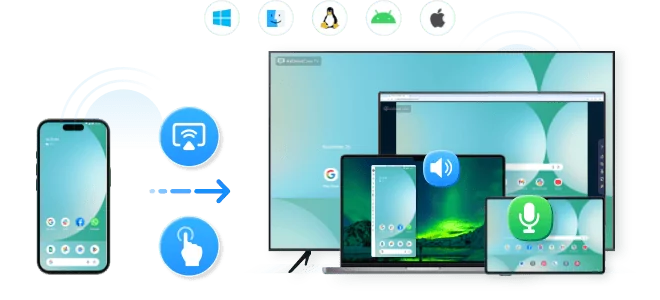
Leave a Reply.